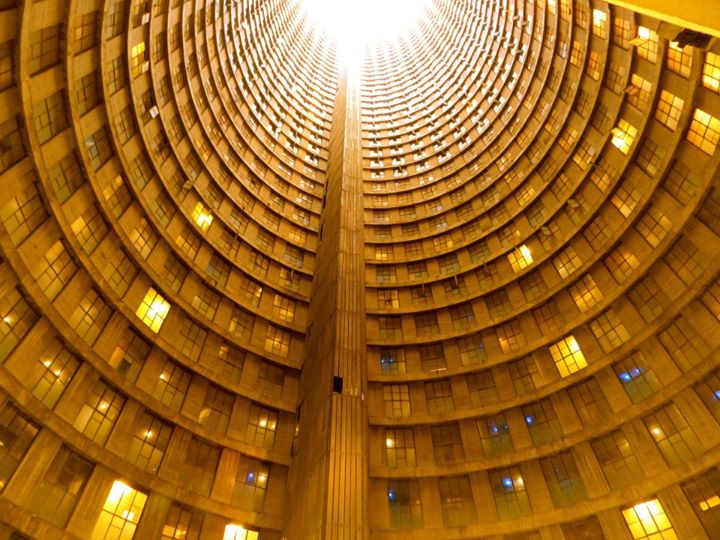Film and Johannesburg’s Ponte City

The German writer Norman Ohler described Johannesburg’s Ponte City, Africa’s tallest residential building, thus: “Ponte sums up all the hope, all the wrong ideas of modernism, all the decay, all the craziness of the city. It is a symbolic building, a sort of white whale, it is concrete fear, the tower of Babel, and yet it is strangely beautiful.” A new documentary by Ingrid Martens, Africa Shafted, adds to the wide variety of cultural and artistic interest in Ponte, home to around 4000 people in Hillbrow, on the edge of downtown Johannesburg. The film purports to look at xenophobia through situating itself in the intense and somewhat claustrophobic surrounding of the tower lifts, which link the 52 stories, housing nationalities from all across Africa. In these lifts, the film encounters residents and their feelings toward one another. The trailer does indeed look interesting.
This isn’t the first time artists have examined Ponte tower; this photographic series by Mikhael Subotzky depicts the residents in the lifts again; the cold steel behind them illuminating the differences in clothing and stance to quite powerful effect. The lifts, both in Africa Shafted and these photographs, become an awkward pod of public space, enclosed, forcing prejudices into close proximity.
As fellow AIAC blogger Tom Devriendt rightly pointed out, decaying buildings are beloved by artists and filmmakers working in or about Africa. A recent article in The (UK) Guardian by writer Brian Dillon examined a European tradition of ‘ruin lust’ — our fondness for decay in culture; whether post-war city ruins speaking of great war and trauma in Europe, the rubble of decaying buildings signifying a rich history, or, in the case of African states, the decay of buildings that symbolized a promise of a better, independent future, that now sit squatted and corroded, a testament to the difficulties of post-colonial reality.
Akosua Adoma Owusu’s film ‘Drexciya,’ included in our Top Ten Films list of 2011, is an interesting experimental approach to decay and ruin in Ghana’s once glitzy ‘riviera’ in Accra. Around the brink of a once-grand swimming pool, Owusu re-animates the pool through the use of sound; laughter and splashing water hauntingly remind of a cultural history now replaced by another, quieter one; women hang their washing on the bushes that surround the pool, a man stores his belongings somewhere on the periphery. It’s not ‘ruin lust’, but perhaps ‘ruin intrigue’, taking the symbols of decay and reanimating them within a current cultural context, rather than pining for a promise never fulfilled, or lost.
Other films, which focus on decaying buildings, include Night Lodgers by Licinio Azevedo, a documentary about the decaying Grande Hotel in Beira, Mozambique.
Lotte Stoof’s Grande Hotel, also about the landmark hotel in Beira, Mozambique.
Finally, different, but related, is François Verster’s film Sea Point Days, a documentary about the changing clientele of a swimming pool, once reserved for whites under Apartheid, now a melting pot of different races, classes and ages.



















